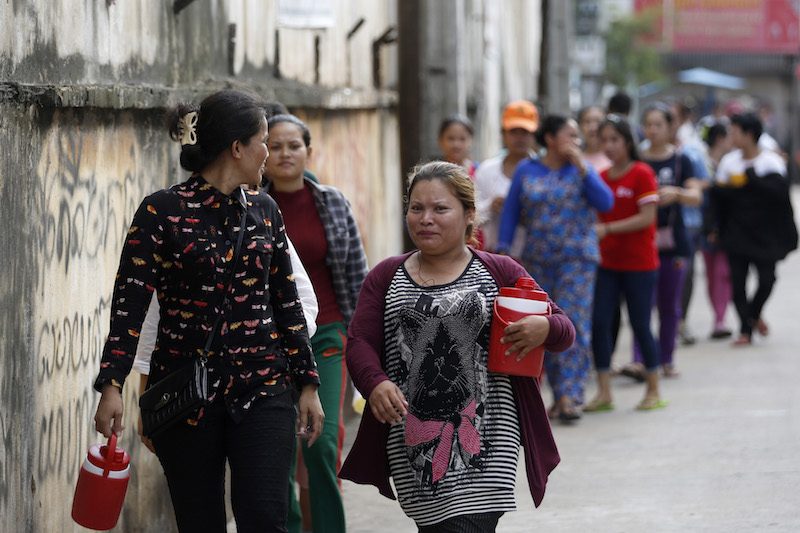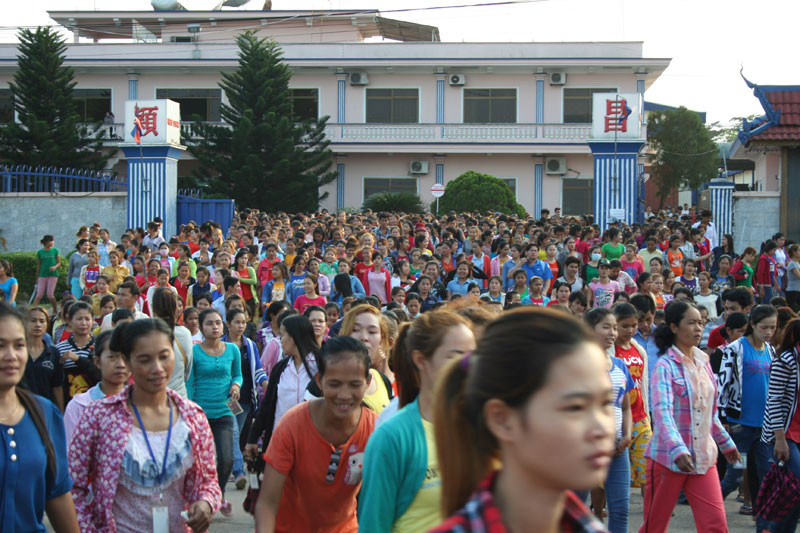Labor rights activists urged the government on Wednesday to help hundreds of thousands of workers who have migrated within the country to vote on Sunday, with a political analyst saying their potential disenfranchisement could swing the elections to the ruling party.
As an opposition spokesman accused the government of intentionally disenfranchising the workers and potentially compromising free and fair elections, the Labor Ministry hit back at critics with its own strongly worded statement, laying responsibility for the disagreement at the feet of former CNRP President Sam Rainsy, an escalation in a dispute that has intensified as Election Day draws near.

The disagreement centers on a statement issued on Monday by Labor Minister Ith Sam Heng that asks factory owners to “please make it easy for workers and employers to go to vote in commune elections in June 2017 wherever they registered.”
That statement is too weak, the opposition and rights groups say, and is in sharp contrast to the ministry’s 2012 statement, issued before that year’s commune elections, which says factory owners “must implement as following…[workers] in Phnom Penh that must travel to other provinces and return to Phnom Penh from those provinces get 3 days off.”
Moeun Tola, head of the workers’ rights group Central, said the change made the CPP appear “afraid of its own shadow,” and he called on the ministry to issue a stronger statement.
“The Ministry of Labor should issue clear instructions to the industry…. to allow their workers and employers to have at least two [paid] days off, June 3 and June 5,” Mr. Tola said.
CNRP spokesman Yim Sovann agreed with Mr. Tola’s concerns on Wednesday, calling the ministry’s letter a “tactic” that affected the fairness of Sunday’s vote.
“I think it could affect about 300,000 to 400,000 people,” Mr. Sovann said. “Some of them register in Phnom Penh, yes, they are OK…But those in the provinces” would be unable to return home to vote, he said.
Mr. Sovann said the ministry’s letter was part of a larger CPP strategy to prevent people from voting.
“During the registration process, 20 percent of eligible voters could not register because they were outside of the country, and because they do not have enough documents,” Mr. Sovann said. “So now, some of the workers registered, and then they cannot go back because they only have one day [off]…. This is politically motivated.”

Political analyst Cham Bunthet, who advises the Grassroots Democracy Party, said the policy would affect more than just factory workers.
“It’s not just only for garment workers, but for those who work in the city [too],” he said on Wednesday. “For example, those who work in the bank, who study at the university, they still don’t get a chance to go and vote.”
He added that the policy’s purpose was to lower voter turnout on Sunday, while the CPP would organize its own transportation for supporters.
“For those who they know exactly will vote for them, they will do whatever possible, helping them travel from the city to the voting stations,” Mr. Bunthet said, a tactic that Central’s Mr. Tola said was a possibility.
The E.U., which imports 43 percent of Cambodia’s total garment and footwear exports, did not respond to a request for comment on Wednesday. The secretary-general of the Garment Manufacturers Association in Cambodia, Ken Loo, also did not answer questions, saying only that “our position remains the same: We respect the official holiday for the election on 4 June.”
Government spokesmen contacted on Wednesday assigned responsibility for the change to the National Election Committee (NEC), the Labor Ministry or Mr. Rainsy.
Council of Ministers spokesman Phay Siphan said he wasn’t sure about the Labor Ministry’s 2012 statement, but added that “this time it is the NEC’s law, not the government’s” that determines such policies.
NEC spokesman Hang Puthea said the decision fell to the Labor Ministry, adding, “The NEC has no authority over private businesses…. If NEC makes days off, it might affect commerce or the country’s economy.”
A Labor Ministry spokesman did not immediately respond to a request for comment, but the ministry issued a statement on Wednesday slamming Mr. Rainsy for issuing a Facebook video accusing the government of suppressing workers’ right to vote.
“The NEC law was celebrated by the two parties, and back then convict Sam Rainsy was the president of the CNRP,” the statement says. “If convict Sam Rainsy really wants workers to return to their hometowns to register and vote, why didn’t the convict request for certain days off [in the law]?”
The statement is an apparent reference to the passage of two election laws—one for commune elections and one for the national election—in March 2015. During that Assembly session, then-CNRP President Sam Rainsy encouraged lawmakers to pass the laws—both of which are still in effect—which were the product of seven months of negotiations between the CPP and CNRP. The commune election law does not mandate days off before or after elections.
“The content of these two laws has been critically and fully discussed, so the National Assembly today does not need to raise this or that point for debating anymore, as the working groups have done the in-depth work,” Mr. Rainsy said at the time.
In the end, according to Mr. Bunthet, the ministry’s move was another example of the opposition being bested by a politically savvier ruling party.
“The CPP is smarter,” he said. “I think if [the policy] is successful, the CPP would still win this election.”




